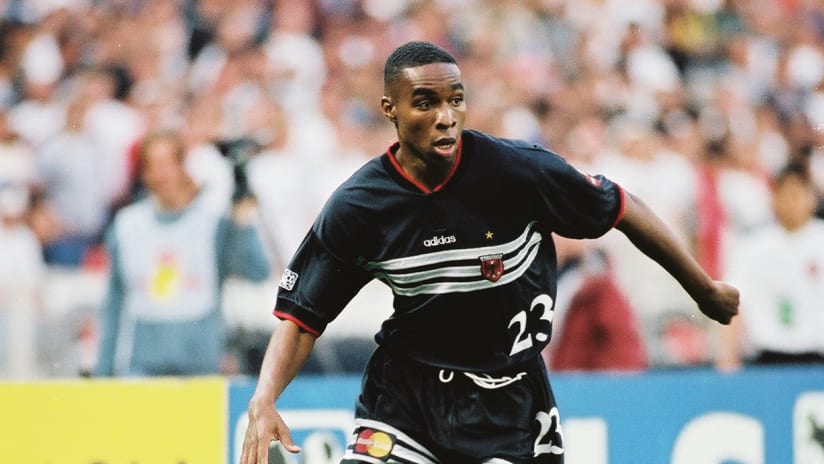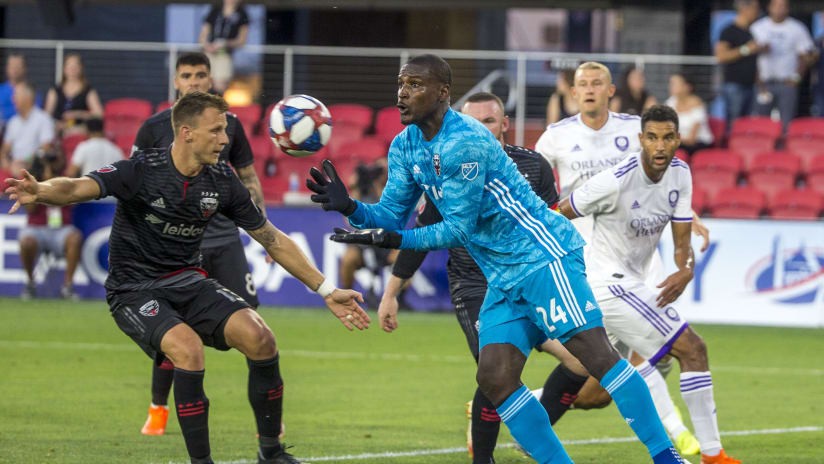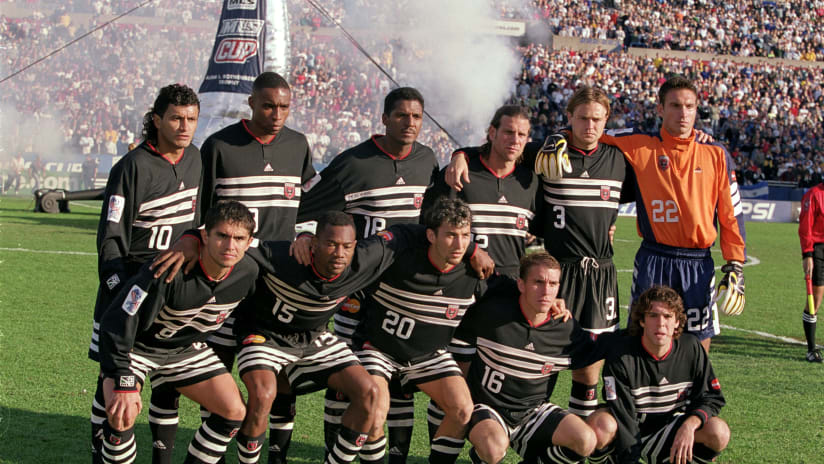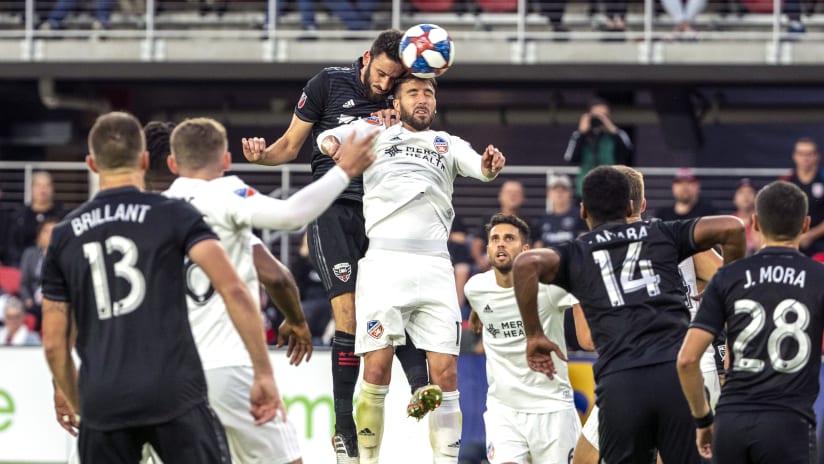Twenty years ago, on Nov. 21, 1999, D.C. United captured its third MLS Cup in four seasons to cement its legacy as the first true dynasty in league history, a claim that would be strengthened when the Black-and-Red captured another title five years later. And on that balmy November afternoon at Foxboro Stadium, before a raucous crowd of nearly 45,000 fans, United bested the LA Galaxy in a 2-0 victory that served as the capstone for a remarkable campaign.
That season, under the direction of first-year coach Thomas Rongen, United posted the best record in MLS (23-9), scored the most goals in MLS (65) and finished with the best defensive performance in franchise history (43 goals conceded). Defender Jeff Agoos, midfielder Marco Etcheverry and forward Jaime Moreno were all named to the MLS Best XI, tied with the Galaxy for the most players from a single team.
Over the next few weeks, we will recreate the ’99 season through the memories of those who lived it: the players, coaches and staff members who exorcised their demons from a crushing defeat in the 1998 MLS Cup to hoist a trophy and parade it through the streets of Washington D.C., rewarding those faithful fans who had stuffed RFK Stadium to its capacity all year.
Our next viewpoint comes from defender Eddie Pope, who was the No. 2 overall pick in the 1996 Major League Soccer College Draft from the University of North Carolina. Pope became an immediate starter with United and remained with the club through 2002. He finished his Black-and-Red career with three MLS Cup titles and was twice named to the league’s Best XI. He went on to play for the New York/New Jersey MetroStars and Real Salt Lake, finishing with more than 250 career appearances in MLS. Pope also earned 82 caps for the U.S. National Team and was part of three World Cup rosters from 1998 to 2006.
iTunes | Spotify | Stitcher | Google Play | SoundCloud
Q: What do you remember about the mindset going into ’99?
A: That for the first time, you know, we weren’t champions anymore. And so we felt like we wanted to get that back, that it just belonged to us. We won in ’96, we won in ’97 and I think in ’98 the reason that heartbreak was so tough for us was that we thought — and we still probably think to this day — that we were by far the best team in the league. We just happened to lose on that day. And we felt like that team was better than the ’96 and ’97 teams, and maybe even the ’99 team. So we were just looking at each other saying, ‘Well, we aren’t champions anymore, so we have to go back and win this thing.’
For the most part in sports, teams don’t go through coaching changes when they’re as successful as D.C. United was, but it was obviously a unique situation with Bruce Arena going to the U.S. National Team. What was it like switching from Bruce to Thomas Rongen?
A: It was hard. You have a coach, everything is working perfectly, you’re super comfortable with that individual, everybody is happy and then you know that you might lose him to something better. He’s climbing the ladder. And as much as everyone would have wanted him to stay, we knew that it wasn’t an argument, that we had to let him go. Especially with where U.S. soccer was at the time — well, not really U.S. soccer — especially where soccer was at the time in the U.S. We just needed to continue to grow and expand and do better, and Bruce was right for that spot. For me, that’s certainly not a slight to (former U.S. National Team coach) Steve Sampson at all, because I thought he did a fantastic job and was a fantastic coach in getting the program to where it even was, especially with the fantastic victory that we had against Brazil. So it was hard because now it was like gosh, we’ve lost the individual who sort of helped guide us to the mountain top. And now all of a sudden, he’s just gone.
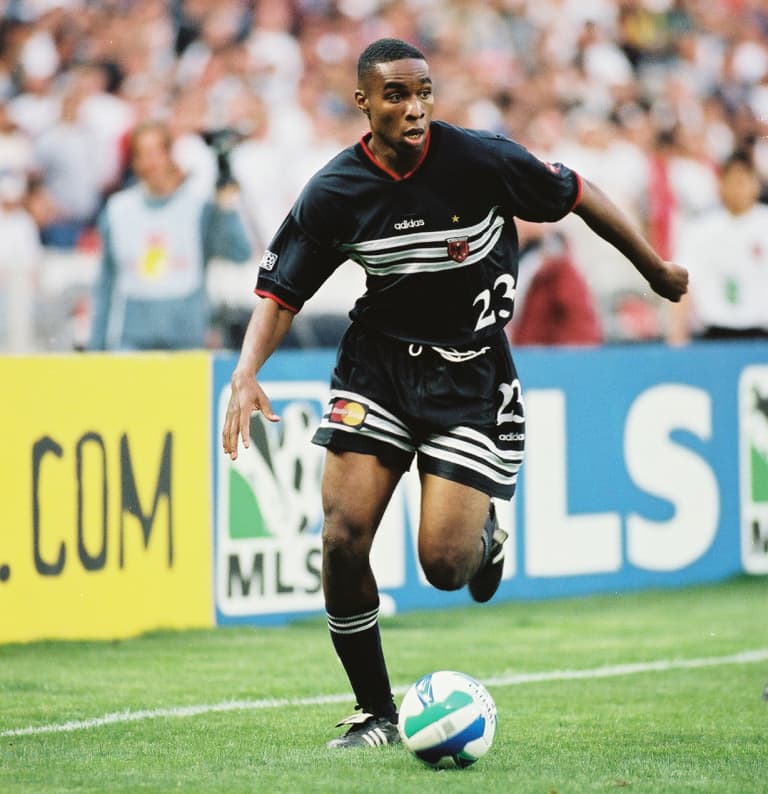
How would you describe what Thomas was like if you had to compare and contrast the way he led a team to the way Bruce did?
A: I think Thomas was brilliant. He got it right from the beginning. And I think there are a lot of coaches that would have come in and said, ‘Hey, we’re going to do this thing my way and we’re going to change it. We’re going to try this, we’re going to try that.’ And Thomas is a super, super intelligent guy. Extremely smart. Borderline genius. And he just comes in and the first thing he says is, ‘I’m not reinventing the wheel here. All I’m going to do is continue to steer the ship in the right direction.’
And I think the temptation to kind of come in for certain individuals to put their thumbprint on it and start kind of pulling things out of whack would have been great, because maybe you’d want to say, ‘Hey, I don’t want this to be Bruce’s championship. I want it to be mine.’ I think for Thomas, again, he made the right decision in saying, ‘Things look great. Things are going in the right place, going in the right way. We’ve been in the championship in ’96, ’97, ’98. I’m just going to continue to move down the road here.’
I think we would have been in big trouble had we gotten anybody else but Thomas.
You started the season by winning 11 of your first 14. When you start out hot like that and you guys already knew the type of talent that you had, did it just feel like business as usual for a team that had such high expectations?
A: Yes. Because I think we were worried a little bit in the beginning that, you know, it’s like any kind of a change, right? It was just different than it was before with a new coach. We were just worried that it wouldn’t be the same. And Thomas, he just did such a great job at making it the same. Don’t get me wrong, he coached. And he did all the things that a head coach would do. He wasn’t sitting back letting us run the show. He was still the good coach that he had always been. But he was just smart enough to coach and push things in the direction that they were already going.
Once we started winning game after game after game to start, I think for everybody it was a sigh of relief, and probably for Thomas as well. Then we just felt like we were rolling. You start looking at the beginning of the season, our expectations at that point are 100% to be in the finals.
Thomas told me that if he were to choose some of his favorite memories from that ’99 season, a lot of them would be things that fans never saw. In particular, he mentioned the 5v5 games in practice where you had one of the best back lines in the league battling with arguably the best attacking unit in MLS. What do you remember about training and the type of intensity that was created?
A: In regards to Thomas and just his coaching, I mean, his training sessions were set up perfectly for the individuals that we had. I think there could have been a tendency that you look at it and you say, ‘A lot of good players, probably some great players here, I’m just going to let this thing run itself.’ But I think his sessions always got the best out of us.
Where we were fortunate is that by having such fantastic strikers in Roy (Lassiter) and in Jaime (Moreno), I’m going up against the best two strikers in the league every day. They’re going up against tough defenders. And then you have Marco (Etcheverry) kind of running the show. ... It just made everybody better every single day, and Thomas was able to just create an environment that sharpened everyone.
To me, best thing was having Roy and Jaime. It was as if — I shouldn’t say as if — I felt like they were competing. One scores and then the next one feels like he has to score. Then the other one scores, and the next one feels like he has to score. One has a fantastic game, and the next game the other one is super amped up to have a good game. I could just sit in the back and just watch and almost just smile and watch the other defenders struggle against them because I knew what it was like in training.
So yeah, I think Thomas is right. Those 5v5 games, the drills, the possession games. One team has the ball and you almost have to stop the possession game, grab the ball and give it to the other team because it was almost impossible to win it back. And everybody’s tongues are wagging out of their mouths. I mean, the possession games were that good. Recently I went back and watched a game, I think it might have been against the MetroStars. Just watching how we kept the ball in possession, I mean, we would have fit into today’s style of play.
What did you think was your role on the team from a leadership standpoint at that time? A couple of your teammates said you weren’t a guy who spoke up often but when you did, you had full attention in the room because of your status. Did you take it upon yourself to speak up at certain points?
A: Your personality is your personality. You obviously get yourself in trouble when you start to get outside of that. I’m not somebody — especially in those environments — who is constantly talking. It’s just not who I am. So if I felt like things were going in the wrong direction, maybe I would have a quiet word with a couple teammates, maybe the coach. And they were good about saying, ‘You know, you need to say something.’ And I think in those moments I would say something, and I did say something. I think those guys did respect that simply because I wasn’t always talking.
But my goal was certainly to lead by example, to play well on the national team. I felt like every time I came back from the national team, part of my job was to be better than when I left, and then to ask that out of my teammates. I think it was sort of a common thing with everyone to gently ask that out of each other, to be better at all times no matter what we were doing.
The one thing again that I do remember saying about that year was that we weren’t the champions anymore. Even though we lost in ’98, we felt like we’re champs because we won other things. And one of the things I do remember saying was that, ‘Hey everybody, let’s not forget, we aren’t the champions anymore. I know we kind of forget that, but we aren’t the champs. Now it’s time for us to go back and get it.’
Was it a unique experience to have so many national team players on one club team?
A: I can’t remember if it was ’98 or ’99 so I may have this wrong, but there was a game that we played where we had 11 — we had a full national team on the field. I think it was Scott Garlick in goal (during the ’98 season), and he had been in the (national team) camp, so I remember we counted that. We were like, ‘He’s been in the camp. He’s in the pool.’ But we had sort of 10 active (national team players from various countries) and then with Scott we had 11.
And I think for us, that’s why our training sessions were so good. One of the things I think we all felt was that sometimes our practices were harder than the games. At the end, we were scrimmaging and we were playing and we felt like that game (in practice) was harder than our games on the weekend.
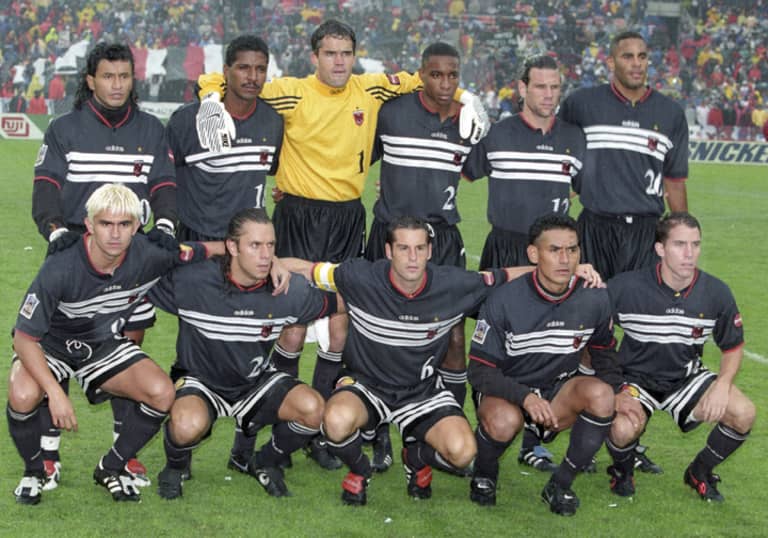
The back line you played in consisted of you, Jeff Agoos, Geoff Aunger and Carey Talley was in there at times, Carlos Llamosa as well. What worked with that defense in terms of chemistry because you finished with the best defensive record in franchise history?
A: The thing was just knowing each other so well and having someone like our younger guys, like a Carey Talley, who I played with at North Carolina so I knew him well. Carlos and I had been together for a long time. We knew each other and were very comfortable. Agoos, Aunger came in and did a great job also. Just really being comfortable with each other. And I think more than anything else, the personalities meshed well.
Probably one of the biggest reasons we did well was Carlos Llamosa was sort of this unsung, no one really paid a ton of attention to (him), one of those guys who just kind of flew under the radar — but was 100% one of the best defenders I’ve ever played beside: 1v1, not a fast guy, got every angle right, timing was impeccable. To this day, easily one of the best defenders I’ve ever played with. It just kind of went unnoticed and it’s why we were so good.
The player I forgot to mention along that back line was Diego Soñora, and he was one of the rare guys who was brought into that group for the ’99 season to join a nucleus that stayed pretty steady. It ended up being his only season with the club, but he started 27 games that year. To bring in somebody who could start 27 games, I assume he was a pretty valuable piece for you guys.
A: I always say for teams that win championships, you almost always need a surprise, something that you didn’t expect to happen and it went really well. I always say with some of our other seasons, one of them was Jaime. We didn’t start with him in ’96 and he shows up and you’re like, ‘Oh my god. How did we luck out and get him?’ And then another one was Tony Sanneh, who even ended up going to Germany and becoming a fantastic player there and having an amazing 2002 World Cup. He was another one.
And I think Diego Soñora was one who came from Argentina and people just didn’t realize the magnitude of the games he had played in. I mean, he played in Boca Juniors-River Plate games that were, you know, 90,000 people. I mean, just incredible amounts of pressure in Argentina and then came here, so this wasn’t that big of a deal to him. He was used to it.
So yeah, the professionalism that he had and the quality of player that he was, it was just one of those surprises that we got. Again, just his experience in the game. I mean, he came in and didn’t miss a beat. Rarely made mistakes. Very good player.
What do you remember about the Eastern Conference Finals against the Columbus Crew where you won Game 1 and then got blasted 5-1 on the road in Game 2. What was the transition period like between Game 2 and Game 3 when you had to win to save your season?
A: Columbus played on a field that was very narrow, wasn’t very big and was kind of built for them. For example, I mean they had this whole sort of thing when the ball goes out of bounds, the ball boy is throwing it to their player as soon as he can and they’re throwing it all the way down the field and they’re in behind you. I mean, it was a whole show that they had with their field. And we just fell victim to it (in Game 2). We didn’t have great performances in the back, including myself.
I think we were just so frustrated in our performance in that second game that when we came home, we were so comfortable at home that we just felt like we were going to win. There was no way we were going to lose this game.
And I think one of the best things that we did, and I give Kevin Payne who was the GM at the time, a lot of credit for this. We were in the locker room and everybody is hanging out (before Game 3) and we’re 15 or 20 minutes from going out. And Kevin Payne put together a highlight reel from ’96 on, and everyone just sat there and watched it. And that’s what we watched right before we went out on the field.
It was such a perfect sort of like — I don’t want to say mind game — but just mentally, he was smart in doing that to sort of remind us of how successful we had been, where we had been, the things we had done, and it gave us that invincible feeling again. So we watched that highlight reel right before we went out. Got everybody super pumped. Everyone is screaming and yelling as we went in the tunnel, and the performances that day were amazing from the back all the way up. And if I’m not mistaken, I believe that’s the game Roy scored on a bicycle kick.
After that video, Marco’s reaction, it was the most pumped I had seen him ever. He was super hyped. And we didn’t typically see him like that. He was just super pumped, and I think it lifted everyone else.
I don’t know if you want to confirm or deny this, but Thomas Rongen said after Game 2 in Columbus, after that loss, he remembered you speaking up in the locker room and saying something to the effect of, ‘Over my dead body is Columbus going to beat us in Game 3 when we go back to RFK Stadium.’
A: Oh yeah, he’s right. My language was probably worse than that, but yes. I think we were just so disappointed in ourselves. I was disappointed in our performance as a team, my performance individually. We were all perfectionists, and I think other guys were disappointed in their performances. As a group we were just like, ‘This is crazy. This is not who we are.’
The other thing was, if I remember correctly, the way Columbus won the game they were very proud. And they should have been because they were very, very good on that day. And I think that irked us as well. And then for me it was just like I cannot wait to get to this next game.
The other thing that probably makes sense to mention as well is they were pretty much — New York was our rival but so was Columbus. We had some really tough games against them, so I think they probably felt that way too, that it was kind of like we knew we were getting great opponents. I mean, you talk about Brian McBride who went in and, for all intents and purposes, manhandled the English Premier League. They were great players as well, and this was the team we really wanted to beat. And they really wanted to beat us. So it was kind of like, ‘We’re not going home and getting beat at home. No chance is that happening.’ Thomas is right.
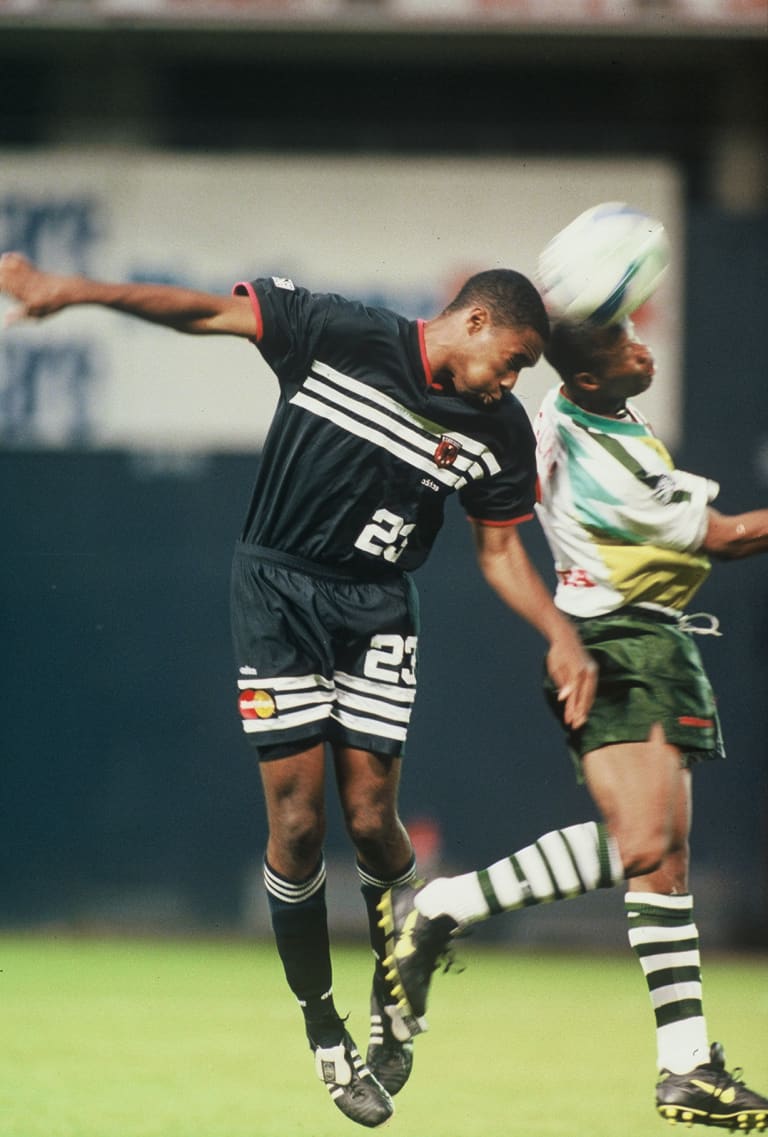
I believe that was the game where Columbus forward Stern John was juggling to run out the clock.
A: Yup. There you go. I wanted to be nice about, but that’s right. (Laughs)
Going forward to MLS Cup, it’s a place where you guys were comfortable, you’d been there several times before. Pretty much everybody on the roster had experience. But feeling like you were on the precipice of reaching the only goal you had set for yourself that season, were there any nerves or anxiousness knowing that if MLS Cup goes south, everything you had worked for that year would have fallen short?
A: Definitely there were nerves. Gosh, you’d certainly have ice in your veins if you didn’t have nerves. For me, whenever I played in championships, I mean, I always felt so, so lucky and fortunate to be in those championship games. It could have been an MLS Cup, a U.S. Open Cup championship, a CONCACAF championship, Interamerican Cup championship — any of those I felt like these are once-in-a-lifetime opportunities. These rarely come along. My mentality was always that there’s no way I’m losing this game. That’s always what came through my mind as I’m walking out on the field. I’m looking around and I’m like, ‘I’m not losing this game. I am not losing this game for sure.’ It wasn’t really to psych myself up, it was just the statement I felt like I had in my brain, ‘I’m going to do everything I have to do and make sure we win this game.’
For me, it was a mentality of I cannot bear losing this game and dealing with the way that feels. Obviously it was just better to try and leave it all there on the field and not deal with losing afterward. I couldn’t bear with what it felt like afterward. And I’m sure other guys probably felt the same way.
So what went through your mind, then, when Jaime pokes the ball into the net to take a 1-0 lead over the LA Galaxy in the 19th minute?
A: When he scored, the ball was kind of like flying around, floating around. At that point, Jaime and Roy would often say, ‘All right, lock it down in the back.’ Whether they said it or I had it in my head, I was just thinking, ‘We will ride this thing out. We’ve got more than what we need to win. We have a goal. And now it’s our job to lock it down in the back.’ That’s what went through my head was a shutout, no goals (allowed), let’s hope we (score) another.
And how about when Ben Olsen scored his later in the half to give United a 2-0 lead?
A: I would say when Ben scored his I was like, ‘No chance they’re scoring two on us. That’s not happening today.’ And then I felt bad for (Galaxy goalkeeper) Kevin Hartman (who slipped and gave the ball away to Olsen). Really good goalkeeper. You look at these things within a game and most people would probably say who cares, but it’s a tough mistake to make in such a big game. I certainly felt for him.
But obviously happy for us. (I kept thinking) even if I had to kill somebody, they’re not scoring two goals. That’s not happening in that game. We start 0-0 and we got one, and now we have a second one? There’s just no chance they’re coming back from that. No chance.
And I would say obviously what helped us in a big way was (Galaxy center back) Robin Fraser’s injury. I mean, that game would not have gone the way that it went if he hadn’t had the unfortunate injury. Fantastic player. Obviously now is a fantastic coach (for the Colorado Rapids). And again, you feel for someone when that happens to them in a big game, especially such a serious injury. At that time, the competition, the competitiveness sort of takes a back seat and you hope they’re OK, but you really feel for them that they didn’t have the opportunity to finish out that game.
What did it feel like when the final whistle sounded and you won? You’d hoisted the MLS Cup before. You’ve played in World Cups and at very, very high levels for the U.S. National Team. But what did it feel like to kind of come back from chasing that demon in ’98, if you will, and then achieving everything you wanted to the following year?
A: That mission-accomplished feeling. It had been so long since we lost in the final the year before. We’ll still argue — I’ll argue — with (former Chicago Fire head coach) Bob Bradley that the goal was offside (in ’98). I haven’t even looked at it lately, but sometimes I’m just teasing him. Just to lose that way, right?
And it had been such a long road for us (in ’99). That one feels like redemption, all those things. Yeah, it was a surreal feeling. It was one that we felt like we deserved, even before the season started. It was ours to lose. So again, I think every team sets out that they’re going to win MLS Cup, and that’s your goal and you set it. Sometimes you believe it, and sometimes you don’t. We believed it 100%. We felt like it was ours to lose. The season is so long, and to be able to do that from day one all the way to the end was unbelievably gratifying.
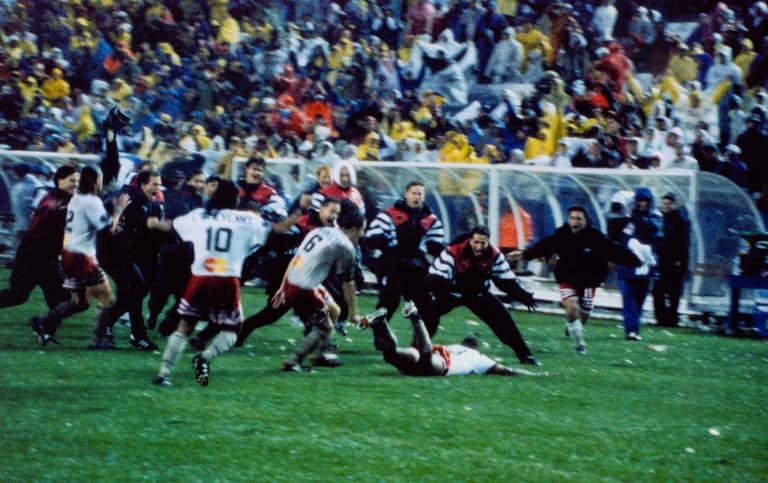
The last question I had for you is this: To be able to bring the Cup back to D.C. and reward the fans for what they had given you that season and also the years prior, was that a nice feeling in ’99?
A: Oh yeah. We had the most unique fanbase in the league. So for us, when we lost in ’98, we felt like we let the fanbase down. Again, we had fans that showed up, that participated, that loved the team, that loved the sport and were always there. You’d go to some other markets and there’s nobody in the stands. So we felt like especially from the Screaming Eagles and La Barra Brava, we were just crushed that we went out there and didn’t bring it back (in ’98). So for us, we always felt like we had a special relationship with our fans. It was unbelievable to be able to bring that back to them.
Again, as we were sort of struggling through that year, from the loss all the way to the (next) championship, a lot of that was we need to bring it home for our fans. We felt like hey, when we lose, they lose. But when we win, they win. So yeah, that was super important to us.
If you look at, for example, in ’97 I actually have our team picture. But you look at ’97 and the fans that are in the stands, you know, poor Colorado (coming to play us at RFK Stadium). It’s like, ‘Where did we show up to?’ They’re thinking it’s going to look like where they play. Those are things that as players you just don’t forget.
And that was a huge part of coming back home from Game 2 to Game 3 against Columbus (in ’99). I can’t remember exactly what was said but I know that I did some radio show or some media, maybe it was just post-practice media, and I was like, ‘We’re expecting everybody to be there. This has to be a big-time home game for us, and we want everybody there. Loud. Proud.’
And we felt like we needed it to beat Columbus.

